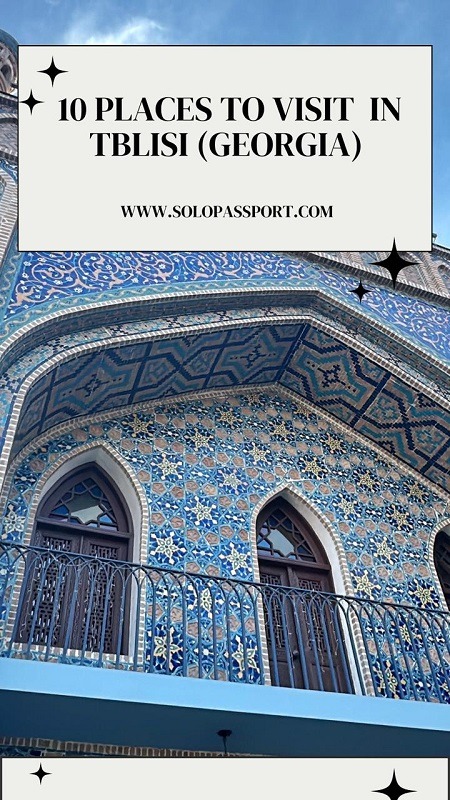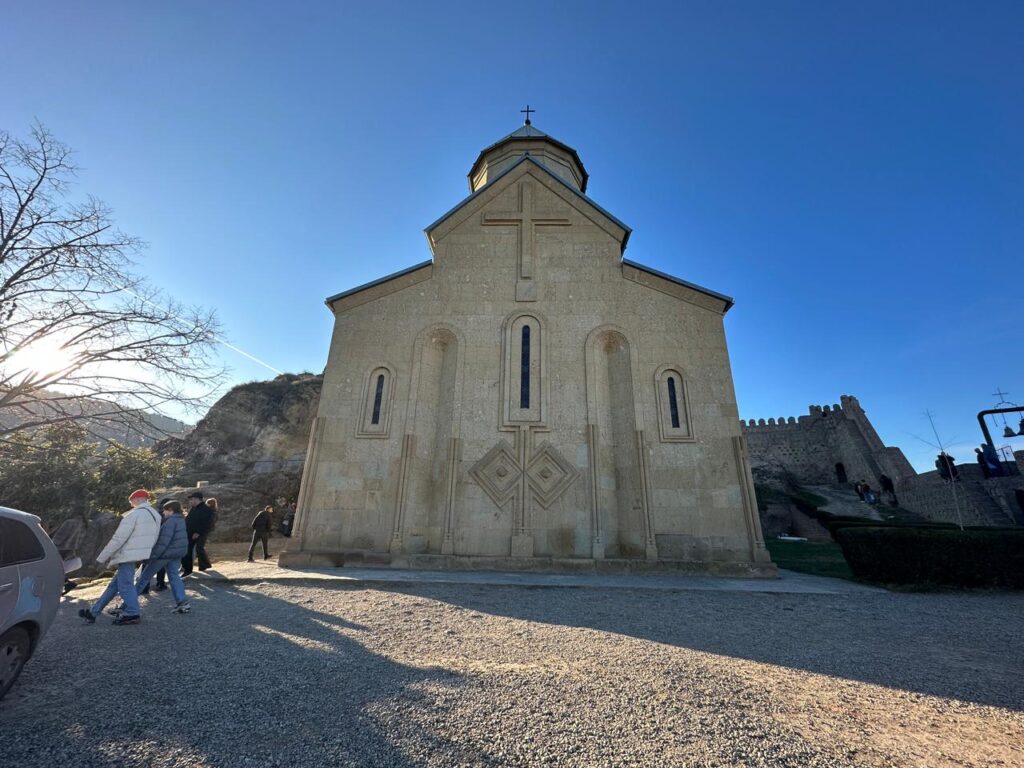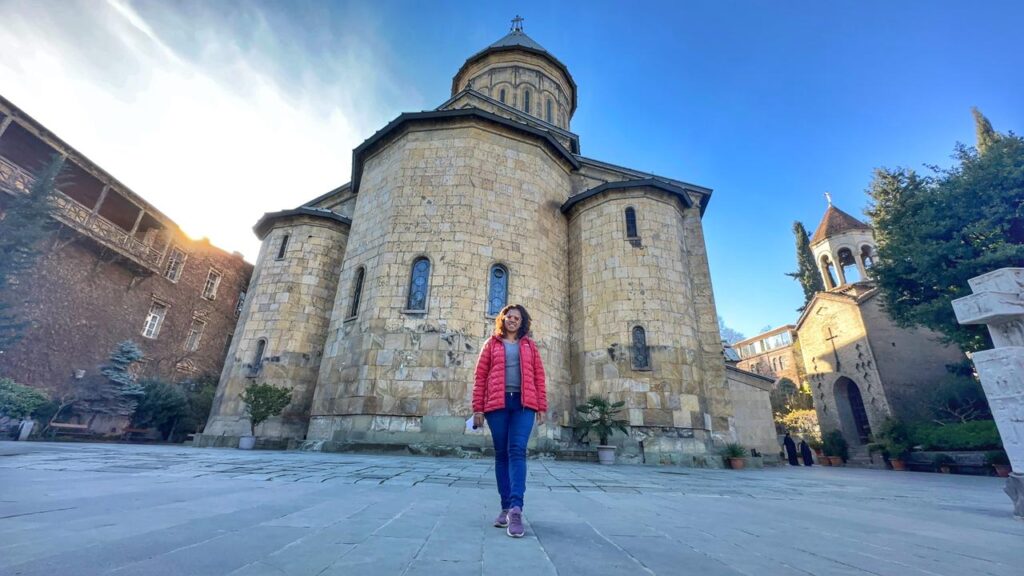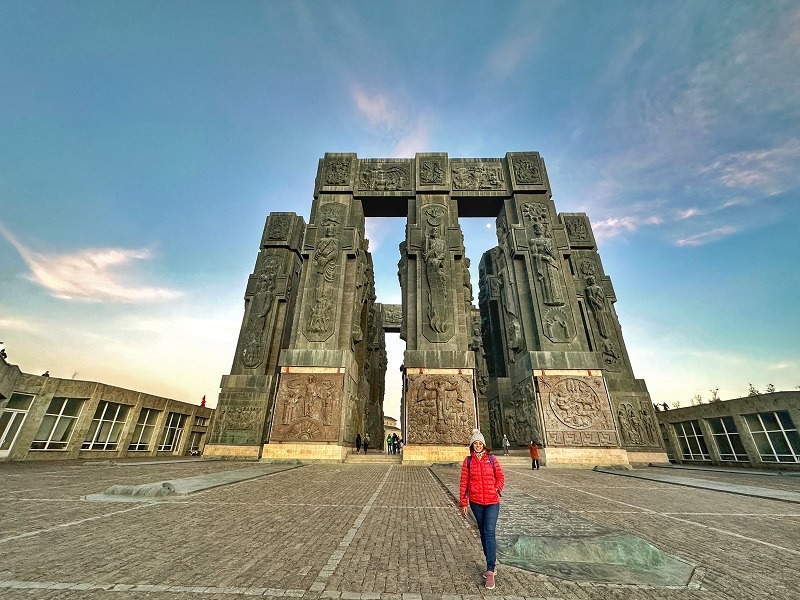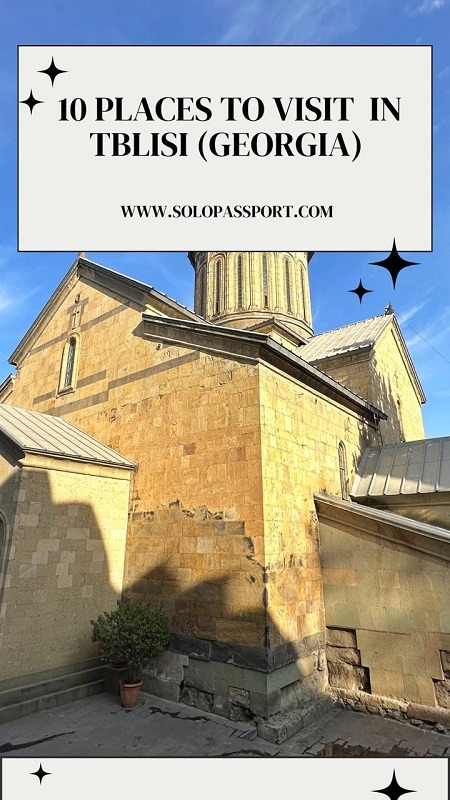10 Best Things To See in Tbilisi in 2024
Discover the top attractions and must-see sights in Tbilisi! Uncover Georgia’s capital city’s vibrant culture, rich history, and stunning architecture. From the iconic Narikala Fortress to the bustling streets of Old Tbilisi, immerse yourself in the charm and beauty of this historic destination.
Explore the diverse range of experiences, from sampling traditional Georgian cuisine to strolling through picturesque parks. Whether you’re a history buff, foodie, or simply seeking adventure, Tbilisi offers something for everyone to enjoy. Plan your unforgettable journey and uncover the best of Tbilisi’s hidden gems and renowned landmarks.
Tbilisi is one of the most captivating cities I’ve enjoyed exploring. Its abundance of attractions caters to every type of traveler, promising a fulfilling experience. The city’s ambiance pulsates with history, captivating visitors with its rich cultural tapestry. Georgian culture, with its distinct charm, is both fascinating and endearing. Join me as I highlight Tbilisi’s top 10 must-visit destinations, inviting you to uncover the city’s enchanting allure.
Also, Read Europe Travel Planner
Page Contents
PIN for later reference – Best Things To See in Tbilisi
This article may contain affiliate links, meaning if you decide to purchase via my links, I may earn a commission at no additional cost to you. For complete information, please see our affiliate disclaimer here.
About Tbilisi
Established in the 5th century under the reign of Vakhtang I of Iberia, Tbilisi proudly serves as the capital of Georgia. Once referred to as Tiflis, this historic city is situated along the picturesque banks of the River Kura.
The name “Tbilisi” finds its roots in the Old Georgian language, derived from the words “t’bilisi” or “tpili,” signifying warmth. This aptly reflects the presence of the area’s renowned sulphuric hot springs, which have long been a defining feature of the city.
Best Time to Visit Tbilisi
Tbilisi boasts a diverse climate, experiencing all four seasons throughout the year.
- Summer – During the summer months of June to August, Tbilisi enjoys dry, hot weather with temperatures ranging from 20 to 25 degrees Celsius. This period also sees a peak in tourist activity, making it the busiest season in the city.
- Winter – From November to March, winter brings colder temperatures, with January being the coldest month. Temperatures often dip into single digits, with lows reaching -1 degrees Celsius.
- Spring – Spring, from March to May, offers pleasant weather, free from summer heat and winter chill extremes, making it an ideal time to visit Tbilisi.
- Autumn – Autumn, spanning from September to November, is characterized by the vibrant hues of falling leaves and temperatures dropping below 20 degrees Celsius.
The optimal time to visit Tbilisi depends on personal preferences and desired activities. Still, the spring and autumn months generally offer milder weather and fewer crowds, making them favorable for exploration and sightseeing.
How to Get to Tbilisi?
- By Air – Tbilisi is served by a well-connected international and domestic airport, offering flights to and from major cities worldwide. Airlines like Air Arabia provide convenient transit options, with layovers in hubs such as Sharjah.
- Intercity Travel in Georgia – Traveling between cities in Georgia is facilitated by a network of frequent trains and buses. For comprehensive information on routes, schedules, fares, and bookings, travelers can refer to the TKT website, ensuring seamless travel planning and connectivity throughout the country.
Transportation within Tbilisi
The public transport in Tbilisi is efficient, offering two primary modes of commuting within the city:
- Metro – Tbilisi’s metro system comprises two lines, serving 23 stations and operating daily from 6 AM to 12 AM. A single metro journey costs 1 Georgian Lari.
- Buses – The city boasts a comprehensive bus network, with frequent services connecting various areas. A one-way bus fare also amounts to 1 Georgian Lari.
To access the metro and Rike-Narikala cable car, travelers must acquire a Travel Card for 2 Georgian Lari at any metro station. This versatile card facilitates payment for both modes of transportation. Passengers can use the Travel Card or cash to make fare payments for bus rides.
Where to Stay in Tbilisi?
Musmore Boutique Hotel
For budget-conscious travelers seeking accommodation close to the city center, the Musmore Boutique Hotel is an ideal choice. This charming hotel near Liberty Square offers cozy yet affordable rooms and an onsite restaurant. Guests can expect a warm and welcoming atmosphere, with friendly staff ensuring a homely experience throughout their stay.
Sheraton Grand Tbilisi Metechi Palace
Nestled in Tbilisi’s historic Old Town, the Sheraton Grand Tbilisi Metechi Palace by Marriott stands as a beacon of luxury and refinement. Boasting a prestigious 5-star rating and a storied heritage, this hotel promises an unparalleled experience of luxury and elegance. From impeccable service to breathtaking views of Tbilisi, guests are treated to a lavish retreat where every comfort is meticulously attended.
Visitor Information
Money Exchange and ATMs
In Tbilisi, the official currency is the Georgian Lari, although Euros are widely accepted throughout the city. Money exchange centers and ATMs are available across Tbilisi, including the bustling old town area. These exchange facilities accept significant currencies such as USD and Euros.
While some money exchange centers may accommodate Indian Rupees, it’s important to note that the exchange rate for Indian Rupees to Georgian Lari tends to be unfavorable, resulting in potential losses. Hence, it’s advisable to avoid exchanging Indian Rupees at these centers.
ATMs offer the convenience of withdrawing money in either USD or Georgian Lari. The exchange rate at these ATMs depends on the bank associated with your credit or debit card.
Additionally, visitors should be aware of “Pay machines” in Tbilisi, resembling ATMs, where they can purchase transportation cards and other services. These machines provide a convenient alternative for various transactions within the city.
Dress Code
In Tbilisi, the city’s atmosphere is notably relaxed regarding dress codes, allowing visitors to wear attire of their choice throughout most areas. However, it’s essential to adhere to specific dress guidelines when entering religious centers such as churches:
- Women are required to cover their heads and wear a skirt, often provided at the entrance of churches. Alternatively, a scarf can be used to cover the head.
- Men should remove any hats or caps before entering.
- Regardless of gender, all visitors are expected to wear appropriate, modest clothing that covers the shoulders and legs.
By respecting these dress codes, visitors can ensure a culturally sensitive and enjoyable experience when exploring Tbilisi’s religious sites.
10 Best Things To See in Tbilisi
Those who relish discovering a city on foot, consider embarking on a self-guided Tbilisi walking tour. This immersive experience allows you to explore many captivating landmarks at your own leisurely pace.
Freedom or Liberty Square
At the heart of Tbilisi, Freedom Square, also known as Liberty Square, has been a focal point for numerous public demonstrations throughout its history. Previously known by various names, including Erivansky Square during Imperial Russia’s reign and Beria or Lenin Square during the Soviet era, it holds significant historical importance.
Notably, it was the site of the infamous 1907 Tiflis bank robbery. The square is flanked by an array of offices, cafes, restaurants, and banks, including the Tbilisi City Assembly, adding to its vibrant and dynamic atmosphere.
Rustaveli Theatre
Nestled along Rustaveli Avenue, the Rustaveli National Theatre is Georgia’s most prominent and one of its oldest theatres. Established in 1887 as the Artists’ Society, this prestigious institution boasts three stages, serving as a versatile venue for many performances, conferences, and events.
Chronicles of Tbilisi
Among the remarkable sites I explored in Tbilisi was the Chronicles of Tbilisi. Crafted in 1985 by Zurab Tsereteli, this monument comprises 16 pillars narrating the rich, 3000-year-old history of Georgia and depicting stories from the life of Christ. For an unforgettable experience, the best time to visit the Chronicles of Tbilisi is at sunset, when the monument is bathed in the warm hues of the fading daylight.
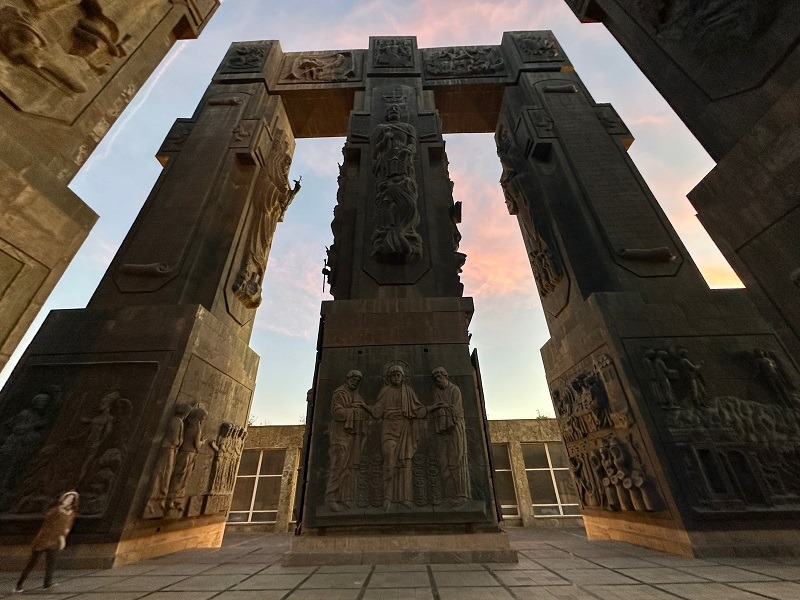
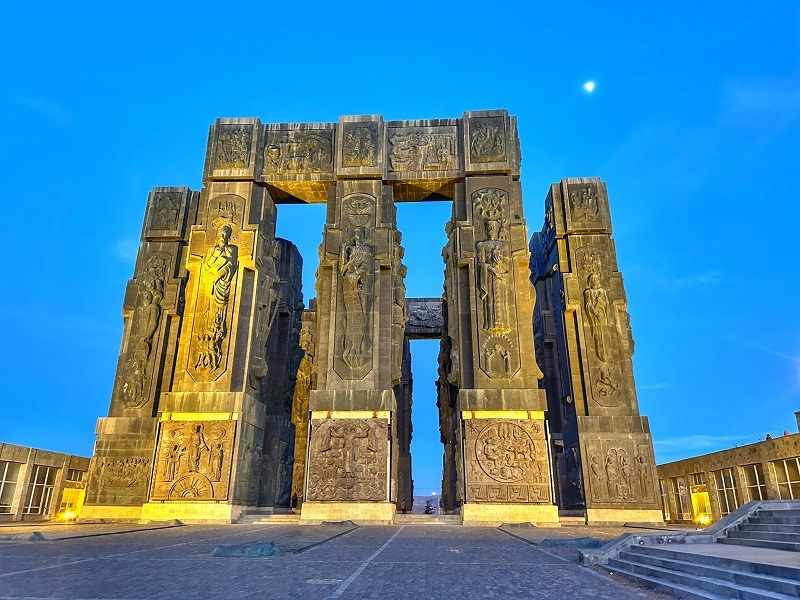
Bridge of Peace
Unveiled in 2010, the Bridge of Peace is a striking bow-shaped pedestrian bridge spanning the Kura River. Stretching gracefully for 150 meters, this architectural marvel is crafted from steel and glass, evoking imagery reminiscent of a marine creature. Among locals, the bridge has garnered the affectionate nickname “Always Ultra,” drawing comparisons to a popular feminine hygiene product due to its distinctive shape.
Mother of Georgia
Constructed in 1958 to commemorate Tbilisi’s 1500th anniversary, the Mother of Georgia, also known as Kartvlis Deda, is an iconic symbol of Georgian national character. This monumental statue depicts a towering figure, with one hand extending a bowl of wine to welcome friends while the other hand wields a sword in defence against enemies.
Holy Trinity Cathedral of Tbilisi
Completed between 1995 and 2004, the Holy Trinity Cathedral of Tbilisi, also known as Sameba, stands as one of the world’s most significant religious structures. This Eastern Orthodox cathedral, designed in a traditional Georgian style, is a testament to the country’s rich cultural and architectural heritage.
- Church Hours: Open daily from 8 AM to 10 PM.
Tbilisi Wine Museum
Indeed, wine production can be traced back thousands of years, with Georgia boasting one of the oldest winemaking traditions in the world. The Georgian style, recognized as a UNESCO intangible cultural heritage, dates back over 8000 years, making it a cornerstone of the country’s cultural identity.
The Tbilisi Wine Museum offers a fascinating journey through this rich winemaking history, showcasing artifacts and vessels used in traditional Georgian winemaking, including the iconic chacha.
- Museum Hours: Tuesday to Sunday, from 12 PM to 8 PM. Closed on Mondays.
Narikala Fortress
Dating back to the 4th century, Narikala Fortress is an ancient fortress consisting of two walled sections. The complex also has a church that was recently built in 1996. According to the legend and history, the fortress was constructed by the founder of Tbilisi, King Vakhtang I Gorgasali.
- Fortress timings: 8 AM to 8 PM every day.
Tbilisi Open Air Museum of Ethnography
Established in 1966, the Tbilisi Open Air Museum of Ethnography offers a unique glimpse into Georgia’s cultural heritage. Named after Giorgi Chitaia, the museum showcases a collection of folk architecture and craftwork artifacts in an outdoor setting.
- Museum Hours: Tuesday to Sunday, 10 AM to 6 PM. Closed on Mondays.
Sioni Cathedral
Initially constructed in the 6th and 7th centuries, Sioni Cathedral is a magnificent Orthodox cathedral that exemplifies medieval Georgian architecture. Named after Mount Zion in Jerusalem, this historic church is a testament to Georgia’s rich religious heritage.
- Church Hours: Open daily from 8 AM to 9 PM.
Is Tbilisi Safe for Solo Female Travellers?
Tbilisi proved to be exceptionally safe for solo female travelers during my visit. It ranks among the safest cities I’ve explored, with locals generally minding their affairs. Throughout my stay, I encountered no noteworthy issues. Nonetheless, as with any destination worldwide, exercising caution and staying aware of your surroundings is advisable.
Are you new to solo female travel or have questions about it? Explore our frequently asked questions (FAQ) on solo travel for valuable insights and tips.
Closing Notes
Tbilisi is truly captivating with its diverse attractions, making it a fascinating and beautiful city to explore. Whether you’re a history enthusiast or a culture lover, Tbilisi offers something for every type of traveler. My time in Tbilisi was genuinely delightful, and I’m eager to return, especially during the summer season.
Also, Read Jvari Monastery of Mtskheta, a UNESCO Heritage Site
Have you had the pleasure of visiting Tbilisi? Which of its enchanting sites have you had the opportunity to experience? Share your adventures by writing to me at Solopassport@gmail.com. I’d love to hear about your travels!
How can you support me?
You know how much I love coffee, so you can buy me a coffee – Buy me Coffee!
Or you can purchase from one of the below travel resources without any extra charge to you:
Travel Resources
Book your flight on Skyscanner.com or Trip.com
Reserve your accommodation on Stay22
Reserve your stay at a hostel on HostelWorld
Use RentalCars or DiscoverCars for hiring self-driven cars
Book your tours and travels or purchase tickets on Viator or GetYourGuide
For a universal SIM card, use DrimSim
Buy comprehensive travel insurance on SafetyWing and WorldNomads
If you liked this article and if it was helpful in your planning or travelling, do share, tweet, or pin this post.
Follow me on Instagram | Facebook | YouTube | Twitter | LinkedIn
Do you have a question? Do you want any suggestions and tips for travel, hikes, and scuba dives? Use the Subscription box below to sign up and get updates by email.


